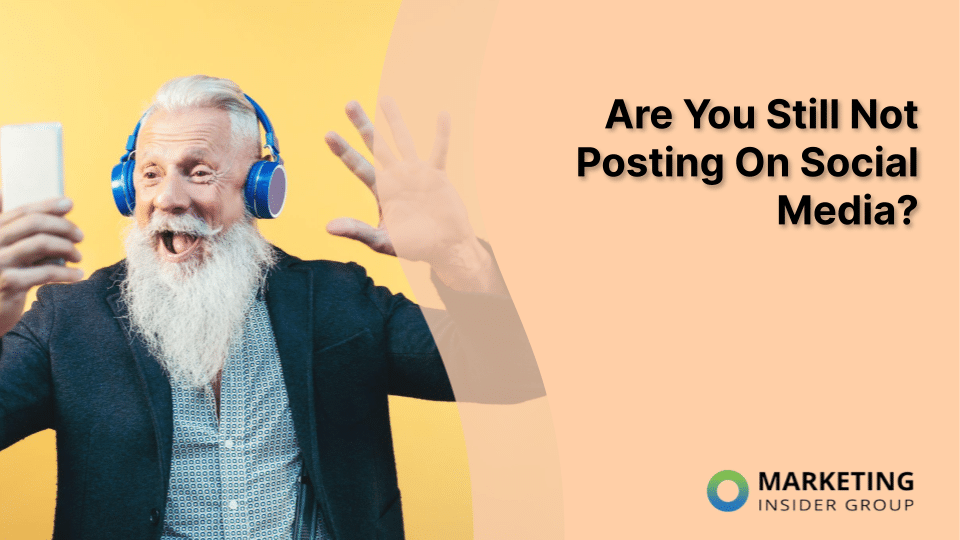
Are You Still Not Posting On Social Media?
There is an observation in social media called “Participation Inequality” or the “1% rule” that says that 1% of us create content, 9% of us share content and 90% of us are pure consumers of the content created.
As a marketer, I feel like it is our role to at least be in the 9%, and ideally in the the 1% of active social users creating or sharing content. I believe Marketers should not be the “content leaches” of the business world but should be leading conversations and driving innovation and new ideas.
But the fact is, the large majority of marketers are still not active in social media. Andrea Edwards (@SAJEIdeas) wrote a great evergreen post titled I Know I Should Be Blogging, But… In the comments, Mark McClure (@samuraiwriter99) was kind enough to use me as an example of how we can connect with other people from anywhere in the world through social conversation and participation.
So, I decided to ask my followers what they see as the top reasons people don’t do social . . . don’t participate . . . don’t engage. I was overwhelmed by the response, but the answers fell into 5 main groups. So here are the top 5 reasons people don’t participate and some tips and guidance on how to get started…
The Top 5 Reasons People Don’t Do Social
I’ve included the actual responses below for more information but here are the top 5 reasons people don’t do social and the number of votes for each :
- Time (16)
- Value (12)
- Not sure what to say (7)
- Don’t understand how to use (6)
- No interest / “It’s for kids” (2)
So while this is not a scientific poll, I think it’s clear the top reasons are lack of time and difficulty in understanding the value of spending the time.
The Top Traits of Successful Social Marketers
Here are some of the top tips I’ve outlined before on how to be a successful social marketer:
- Think about audience first
- Understand that keywords matter
- Respond to questions, comments and responses
- Set clear business objectives for your efforts
- Be consistent
- Be more social and less of a marketer
I’ve also provided these tips for how to get started on Twitter, putting together an effective social media strategy, and social media marketing in B2B.
The Social Imperative
The bottom line is that I feel being active in social is a business and professional imperative and so we need to take these steps:
- Build it in to your day.
- Find ways to scan and filter information.
- Share information relevant or useful for your connections.
- Build strong connections.
- And take the leap of faith and share your views through writing.
So below are the actual responses I received to my question on twitter: “what are the top reasons people resist being active in social media?” I want to thank those of you who responded, Andrea and Mark for their inspiration and all of you for taking the time to read my views…
@BrennerMichael they think its a waste of time OR not worth the time required to be impactful
— steve olenski (@steveolenski) March 13, 2012
@BrennerMichael The biggest excuse I hear for not blogging is… "I don't have the time."
— Stacy Taylor (@StacyTaylor17) March 13, 2012
@BrennerMichael Lack of time, don't want to put the effort in to be successful on a platform, not understanding tools
— Chris Edwards (@toph303) March 13, 2012
@BrennerMichael Lack of time and/or resources to do effectively, whatever "effectively" means.
— TC (@TCoughlin) March 13, 2012
@BrennerMichael 1) Don't understand them and/or don't have any interest (at least, as they understand how they are used). 2) No time for it.
— Jacob Sloan (@jacobsloan) March 13, 2012
@brennermichael Top 3: 1. "No time", 2. "Don't get it", 3. "Can't write"
— Hank Barnes (@Barnes_Hank) March 13, 2012
https://twitter.com/hyperlaine/statuses/179615272536248320
@BrennerMichael that they don't have time and they don't think it's mainstream enough. Sure some are out there, but prob not my audience.
— Cherie Givens (@cgivens) March 13, 2012
@BrennerMichael "don't have enough time" is easily the biggest. "don't understand it" is 2nd
— Kenny Lasley (@klasley1) March 13, 2012
@BrennerMichael Main reason I see for not tweeting (not quite an "excuse" though) is not understanding who's listening
— katiedel (@katiedel) March 13, 2012
@BrennerMichael Biggest excuse for not blogging: Billable work > creating content
— katiedel (@katiedel) March 13, 2012
@BrennerMichael Some: waste of time, unclear benefit, no major insights to share, who cares-world already has too many tweeters!
— Alex Joseph (@FromAlex) March 13, 2012
Takes too much time @BrennerMichael:Biggest excuse you hear from others on why they don't blog, tweet, or use other social media tools?
— JulieKirby (@JulieKirby) March 13, 2012
@brennermichael of course. don't have time, to much effort, not relevant to my market, no roi, wastes time, too hard to control,
— kennymadden1973 (@kennymadden1973) March 13, 2012
https://twitter.com/DrJessicaLanger/statuses/179731091253493761
@BrennerMichael Either it's a waste or time, they don't understand it or it's narcissistic.
— The Seasoned Spoonful (@seasonedspoon01) March 14, 2012
https://twitter.com/catykobe/statuses/179945952541540352
@BrennerMichael they dont understand #, @. Dont know follow/connect strategy. Scared to say something wrong, or dumb. Content ideas.
— Rachel Macik (@RachelMacik) March 14, 2012
@BrennerMichael People just don't have the time
— Information Arts (@InformationArts) March 14, 2012
https://twitter.com/berge31/statuses/179943545837326336
@BrennerMichael It's a three-way tie between: No Time, No ROI, and fear of no control over what people will say about you. #scaredofsocial
— Jonathan Barrick (@j_barrick) March 14, 2012
@BrennerMichael Time (biz and personal). Not sure what to say (primarily twitter for personal use).
— Eric Wittlake (@wittlake) March 14, 2012
While people are increasingly getting on to and using at least one social media platform of their choice, there is still a clear lack of social media strategy on part of both individuals and brands. Our job as marketers is to set that right.







You asked people who do social why people don’t do social?
Yep. Sure did! The question was “what are the top excuses you hear for why people don’t do social?” As socially active people, we are often asked by people why they should bother with social media and then they provide their top excuses. So I believe this is a well-versed group to answer the question.
I’m actually forwarding your blog to some of our solution managers. They are all getting ramped to for social media they have lots of these same issues. I’d say time, is their “face value” issue. But the bigger picture, I believe is that they need to find a way to add a new skill set into their daily work. And that’s much harder.
Well it looks like SAP definitely has a Social presence. 🙂
Yes, not enough time. Which basically means they don’t want to hire an individual to take on the responsibilities. So many are betting that Social Media is a fad, and any time and resources put to supporting are a waste. Well everyone that tweeted likely disagrees as do I, but we don’t have the answer yet. Mobile is only going to continue to grow. PDA’s will continue to get faster and allow you to do more. With little or no social presence as a business, you’re really rolling the dice on the future.
I think another reason my generation – the boomers – avoid social, is fear. Fear of learning something new and maybe hard to learn (at first). I hired a SoMe tutor for a year. I went back to school with her. Otherwise, I would have continued to say, “I don’t need Twitter, Facebook, etc.”
Michael, awesome insight. From my perspective the people who don’t do social media who should are salespeople and marketers. The reasons: “no time”, “no value”, “not sure what to say” are not real reasons. These are symptoms. The real reason is but one: people apply old paradigms to a new medium hoping it would perform the same way. For example, marketers see social media as a broadcasting tool – the TV of today. And it is anything but that… Sales professionals attempt to use social media for one-on-one or mass pitching. Doesn’t work either. Maybe it is a generational thing, but both salespeople and marketers have a long way to go to understand how social media works.
Rachel, thank you so much. I like how you frame this as a new routine issue. It is and habits (bad ones) are hard to break and harder to start (good ones).
Hi Steven, we are trying! But still a long way to go…
I think the social imperative crosses business and personal realms and can work to advance each other. A strong personal brand is good for business and vice a versa.
Bruce you are a master and such a great example for any age group. I talk to college kids all the time and many of them, they don’t always get the value of socal (outside their close peer groups) either. So fear is pervasive across age, country, culture, position. I love how you show that Dads and Boomers can be cool too!
Hi Misha, I agree with you 100%. Symptoms indeed, of the fear of change, the fear of being open and transparent, the fear of connecting. Social = human. And that’s really all it is!
Great post Michael!
I think many marketers are like many sales people.
They talk the talk, but often don’t walk the walk.
Some sales people will say whatever they have to say to close a deal, many marketers are the same way.
It makes marketing harder for people working to deliver real results, content, and add to the community.
Thanks for sharing your insight 🙂
Thanks AJ, interesting you bring that up, you should come back and check out tomorrow’s post.
Do you think that the 80-20 rule is a good one to follow for social marketing?? Meaning 80% being social, 20% marketing??
Social / Content marketing / blogging Is not an easy thing for non-marketing people to get their heads around to start with (its not even easy for many traditional marketeers). Cut your colleagues some slack 🙂
When we introduced blogging+social the first time in our company we failed miserably and received all of the above as reasons. First I was very frustrated about it because without my colleagues input I would have no valuable content – it would just be marketing ‘fluff’ so we started working away some of the barriers.
No Time: our consultants and programmers now get some time to actually write and log it in their timelogging. Because they can log it, they suddenly feel it has some value to the company (they know what we make when they log an hours work for a client so they can relate how important their blogging is for the company)
No value: the timelogging already adds some value, furthermore we report the impact of their social interactions back to them in quarterly meetings, show them who’s blogposts were popular and sometimes are lucky enough to attribute a specific lead to a blogpost. When we see spikes in our web analytics that are attributed to social we send out short thank you e-mails to everybody and explain again how it helps us all ahead. (it motivates the ones already doing it and its a great reminder for the less committed).
No inspiration: Giving them time is not enough, its hard for a programmer or consultant to think like a prospect looking for a solution to a his pain /problem. My colleagues think the other way around, they start from their pride and joy: their software / service solution and try to explain why its so great. This lead to inferior / promotional content and it was really demotivating for them to have me turn their copy upside down. We now brainstorm the next 5 blogposts per person. During the brainstorm I take their imput and write headlines for their post. It really helps them in shifting their point of view to the customer.
Not understanding was the easier one to fix, after some lunch sessions and demo’s the most grasped the concept of following / followers / sharing. On the other hand we don’t expect most of them to actively start building up followers. We rather make it as easy as possible for them to participate and get to your 9% segment. We are now actually at +- 50% of employees that share regular posts and higher if they see more value in it (e.g. help us promote an event, a job opening, …)
It’s a process that will take time and given a certain generation gap there will always be people who we won’t convert. The biggest factor in not succeeding the first time was actually marketing (me) taking it for granted that they would get it, see the value and find it as easy as I do.
Thanks Sven, it sounds like you have been through the same trials I have. hang in there and thanks for sharing your story and encouragement!